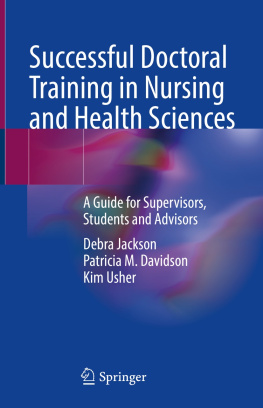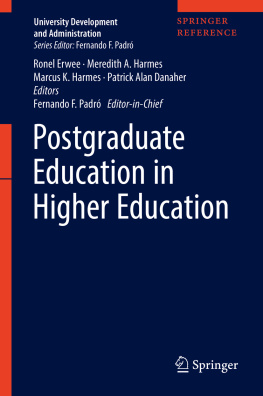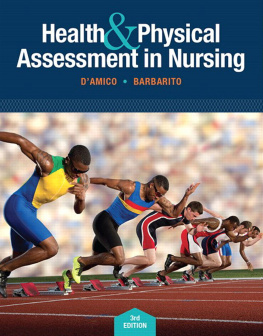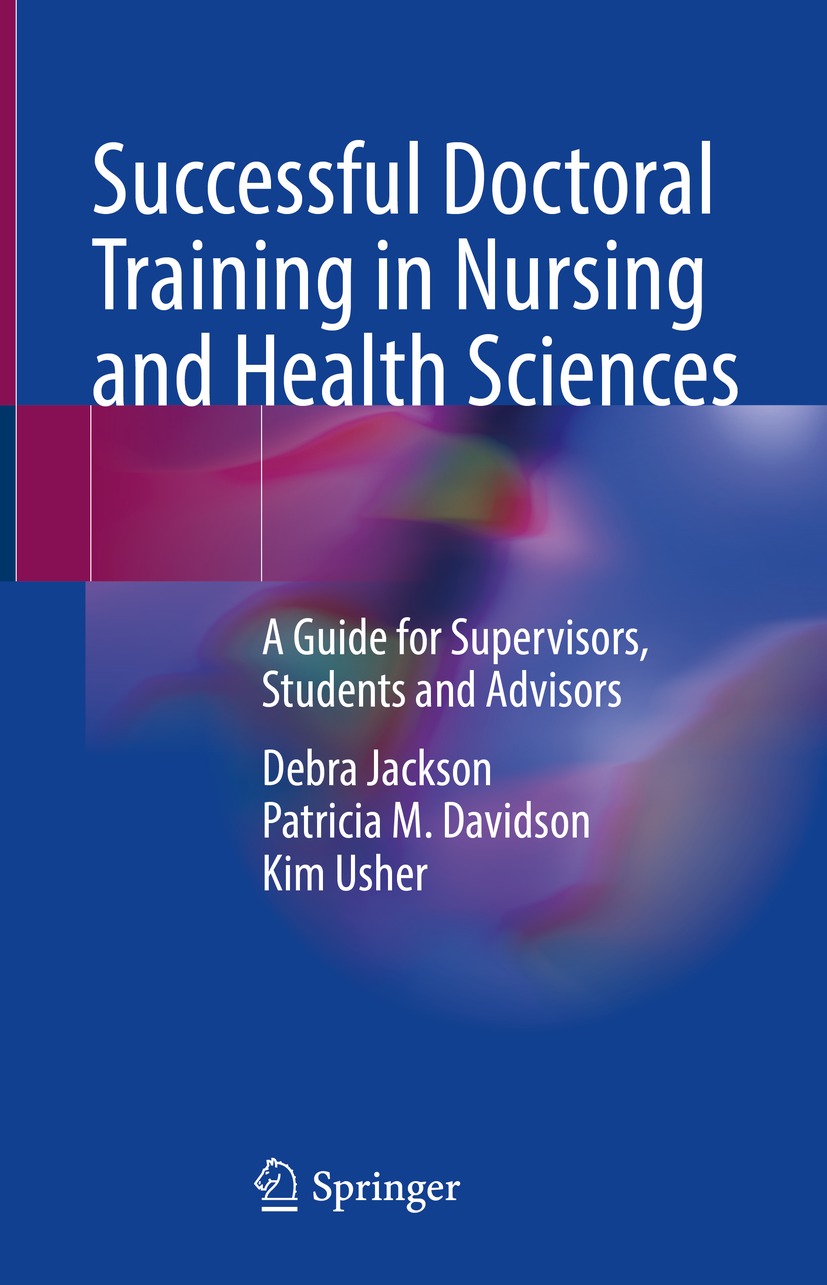Debra Jackson , Patricia M. Davidson and Kim Usher
Successful Doctoral Training in Nursing and Health Sciences
A Guide for Supervisors, Students and Advisors

Logo of the publisher
Debra Jackson
University of Sydney, Sydney, NSW, Australia
Patricia M. Davidson
School of Nursing, Johns Hopkins University, Baltimore, MD, USA
Kim Usher
University of New England, Armidale, NSW, Australia
ISBN 978-3-030-87945-7 e-ISBN 978-3-030-87946-4
https://doi.org/10.1007/978-3-030-87946-4
The Editor(s) (if applicable) and The Author(s), under exclusive license to Springer Nature Switzerland AG 2022
This work is subject to copyright. All rights are solely and exclusively licensed by the Publisher, whether the whole or part of the material is concerned, specifically the rights of translation, reprinting, reuse of illustrations, recitation, broadcasting, reproduction on microfilms or in any other physical way, and transmission or information storage and retrieval, electronic adaptation, computer software, or by similar or dissimilar methodology now known or hereafter developed.
The use of general descriptive names, registered names, trademarks, service marks, etc. in this publication does not imply, even in the absence of a specific statement, that such names are exempt from the relevant protective laws and regulations and therefore free for general use.
The publisher, the authors and the editors are safe to assume that the advice and information in this book are believed to be true and accurate at the date of publication. Neither the publisher nor the authors or the editors give a warranty, expressed or implied, with respect to the material contained herein or for any errors or omissions that may have been made. The publisher remains neutral with regard to jurisdictional claims in published maps and institutional affiliations.
This Springer imprint is published by the registered company Springer Nature Switzerland AG
The registered company address is: Gewerbestrasse 11, 6330 Cham, Switzerland
Supervision is a very rewarding and integral aspect of our work that is central to who we are as scholars, scientists, educationalists, clinicians and researchers. Between us, we have been privileged to personally supervise well over 100 doctoral students to completion, and we have all had responsibility for governance of doctoral programs across several institutions. We dedicate this book to our students, to colleagues who are current doctoral supervisors and their students, as well as to those who will follow us as doctoral students and supervisors. We hope this text contributes to a stronger, more robust culture of doctoral training in nursing and health sciences.
Debra Jackson
Patricia M Davidson
Kim Usher
Preface
Doctoral supervision is a form of teaching and learning that is both unique and distinctive, and essential to the future of nursing and other health disciplines. However, there are relatively few places to share and document our work as supervisors, and much of what we do as supervisors goes unseen and unrecorded. The usual student acknowledgement to supervisors that appears in completed theses are usually highly flattering and written in a spirit of relief to be finally submitting the thesis. While these words are greatly appreciated, they do not capture the complexities and the trials and tribulations of the relationship between supervisors and students. Doctoral studies can be very stressful for students and for supervisors.
Our primary goal in writing this book is to share our own experiences, and provide information and resources that can help to improve the experience of doctoral training for supervisors and students. We all ourselves hold earned doctorates and have served as doctoral examiners many times over, in Australia and internationally. While most of our work has been undertaken within Australia, we have all had considerable international experience and have worked in various countries. We have successfully supervised doctoral students to completion in Australia, New Zealand, Canada, China, Indonesia, Thailand, the United States of America, the United Kingdom, Jordan, Saudi Arabia, Sri Lanka, Taiwan, Ghana, Nepal, Nigeria, Bangladesh and India. So, it is true to say our supervision work has taken us, quite literally, across geographical (as well as intellectual) borders. These supervision opportunities have greatly enriched us personally and professionally.
However, supervision is not an exact science. The question of how we learn supervision is a not straightforward. Pedagogies of supervision are not often discussed, and there can be an assumption that the same approaches we use for undergraduate or graduate students will work equally well for doctoral students. However, we believe that certain skills are needed to best support doctoral students, and we have reflected on how these are learned. There are a range of influences that shape our supervision practices the supervision we ourselves had, various training and development processes we undertake through our employers, things we learn from colleagues along the way, and most of all the things we learn from our students. Through our own supervision activities, we have learned a lot about ourselves as supervisors. We have all experienced working with students with a range of life situations, experiences and learning styles. We have all experienced numerous occasions of supervising in the context of more complicated relationships, such as where the candidate is also a colleague and employed within the same department.
Over the years, our understanding of the pedagogy of supervision has developed and deepened in response to the different needs of our students. As supervisors, we witness (and ourselves experience) the gamut of human emotions from moments of dejection and even despair through to the absolute joy we see in our students and their families and friends when they are successfully examined and are able to graduate. As supervisors, we celebrate the gifts of mentorship, scholarship and sponsorship that keep on giving.
We have grown enormously personally and professionally through our supervision practice. We take constant inspiration from our own students, from sharing their joy in discovery and in witnessing the growth in skill and confidence over the course of their doctoral training. Solving complex problems in health and society is inspirational and a driving force. Over our careers as clinicians, researchers, educationalists and doctoral supervisors, we have developed communities of practice in our work and believe this model has been beneficial for building strength, scale and sustainability of the pedagogy of doctoral education.
We have greatly enjoyed putting this book together, and are delighted to share some of our experiences and insights with you through these pages. This book will be of use to all those engaged in doctoral training, including supervisors and also students. It is our hope that you enjoy this book and find it useful to you in your own doctoral supervision and doctoral studies. Importantly, we hope it will inspire reflective practice and curating of the pedagogy of doctoral studies. We welcome feedback and communication from our readers and wish you well on your own travels through doctoral education.











